Due to the intensive work DevOps engineers and their teams complete on a daily basis, they don’t have time to search for tools to help them complete their work more efficiently and productively. That’s why we have searched for the top DevOps tools and created this list of the most reliable, secure, relevant, and useful tools you can rely on. Many of the tools to make the cut have been around for some time and have proven themselves invaluable to the DevOps process, while others are emerging tools created by developers to help fellow developers work smarter and release even better products. Please note, we have listed our top 50 DevOps tools here, in no particular order.

The leading open source automation server, Jenkins is a DevOps tool for monitoring executions of repeated jobs. This extensible automation engine enables DevOps teams to integrate project changes more easily and access outputs for quickly identifying problems.
Key Features:
- Self-contained Java-based program ready to run out of the box with Windows, Mac OS X, and other Unix-like operating systems
- Continuous integration and continuous delivery
- Easily set up and configured via a web interface
- Hundreds of plugins in the Update Center
Cost: FREE
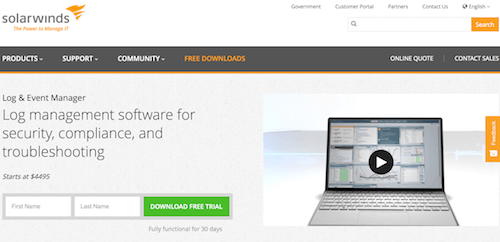
SolarWinds offers IT management software and monitoring tools. DevOps teams turn to their Log & Event Manager software when they need a solution for security, compliance, and troubleshooting.
Key Features:
- Normalize logs to quickly identify security incidents and simplify troubleshooting
- Out-Of-The-Box rules and reports for easily meeting industry compliance requirements
- Node-based licensing
- Real-time event correlation
- Real-time remediation
- File integrity monitoring
- Licenses for 30 nodes to 2,500 nodes
Cost: FREE trial available for 30 days
- LEM30: $4,495 – Up to 30 nodes
- LEM50: $7,485 – Up to 50 nodes
- LEM100: $12,995 – Up to 100 nodes
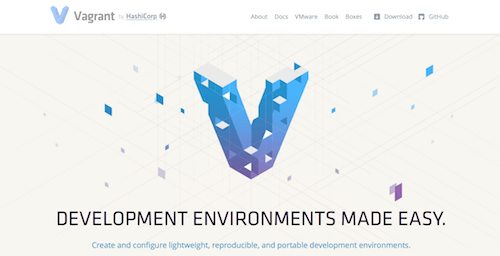
HashiCorp gives organizations the ability to provision, secure, and run any infrastructure for any application with their Suite, which includes Vagrant, Packer, Terraform, Vault, Nomad, and Consul. Vagrant, specifically, helps DevOps teams create and configure lightweight, reproducible, and portable development environments. Vagrant also features easy-to-use workflows and focuses on automation, saving DevOps teams time in setting up development environments.
Key Features:
- No complicated setup process; simply download and install within minutes on Mac OS X, Windows, or a popular distribution of Linux
- Create a single file for projects describing the type of machine you want, the software you want to install, and how you want to access the machine, and then store the file with your project code
- Use a single command, vagrant up, and watch as Vagrant puts together your complete development environment so that DevOps team members have identical development environments
Cost: FREE

PagerDuty is a DevOps tool that helps teams and businesses protect their brand reputation and customer experiences. PagerDuty is an incident management solution supporting continuous delivery strategy and enabling DevOps teams to deliver high-performing apps and superior customer experiences.
Key Features:
- Real-time alerts
- Gain visibility into critical systems and applications
- Quickly detect, triage, and resolve incidents from development through production
- Full-stack visibility across dev and production environments
- Event intelligence for actionable insights
Cost: FREE trial available for 14 days
- Lite: $9/month/user billed annually – Unlimited notifications and 180+ integrations with top tools
- Basic: $29/month/user billed annually – Unlimited notifications and 200+ integrations with top tools
- Standard: $49/month/user billed annually – Unlimited global notifications and 200+ integrations with top tools
- Enterprise: $99/month/user billed annually – Unlimited global notifications and 200+ integrations with top tools
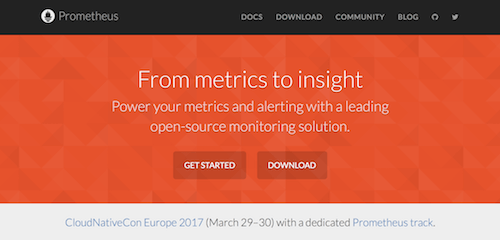
Prometheus, an open-source service monitoring system and time series database, powers DevOps teams’ metrics and alerting. Prometheus especially is popular with teams using Grafana.
Key Features:
- Flexible query language for slicing and dicing collected time series data to generate graphs, tables, and alerts
- Stores time series in memory and on local disk with scaling achieved by functional sharing and federation
- Supports more than 10 languages and includes easy-to-implement custom libraries
- Alerts based on Prometheus’s flexible query language
- Alert manager handles notifications and silencing
Cost: FREE
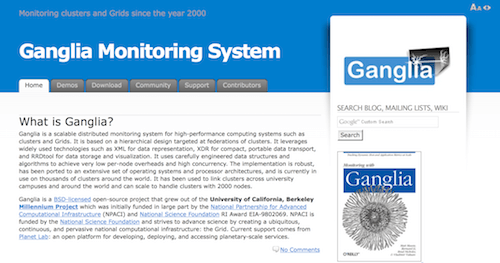
Ganglia provides DevOps teams with cluster and grid monitoring capabilities. This scalable tool is designed for high-performance computing systems like clusters and grids. Ganglia makes use of XML, XDR, and RRD tools.
Key Features:
- Scalable distributed monitoring system based on a hierarchical design targeted at federations of clusters
- Achieves low per-node overheads for high concurrency
- Can scale to handle clusters with 2,000 nodes
Cost: FREE
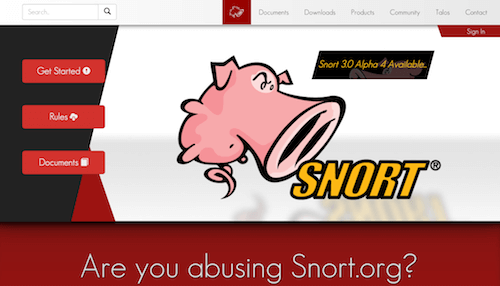
Snort is a DevOps tool for security. An open source intrusion prevention system, Snort is capable of real-time traffic analysis and packet logging. Snort boasts more than 500,000 registered users and has been downloaded more than 5 million times, making it the most widely deployed intrusion prevention system in the world.
Key Features:
- Performs protocol analysis and content searching and matching
- Provides real-time traffic analysis and packet logging
- Detects buffer overflows, stealth port scans, CGI attacks, SMB proves, OS fingerprinting attempts, and other attacks and probes
Cost: FREE
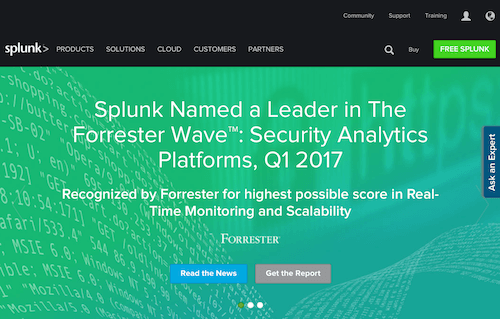
Designed to make machine data accessible, usable, and valuable to everyone, Splunk delivers operational intelligence to DevOps teams. The insights Splunk gives help make companies more productive, competitive, and secure.
Key Features:
- Actionable insights with data-driven analytics
- Next-generation monitoring and analytics solution
- Delivers a central, unified view of IT services
- Detects patterns, dynamically adapts thresholds, highlights anomalies, and pinpoints areas of impact
Cost: FREE trial available; Contact for a quote

Helping DevOps teams daily, Nagios is the industry standard in IT infrastructure monitoring. DevOps teams identify and correct problems with world-class network, server, and log monitoring from Nagios.
Key Features:
- Nagios XI monitors mission-critical infrastructure components such as applications, services, operating systems, network protocols, system metrics, and network infrastructure
- Nagios Log Server simplifies the process of searching log data
- Nagios Network Analyzer delivers an in-depth look at network traffic sources and potential security threats for quickly gathering high-level information on network health
Cost:
- Nagios XI: Starts at $1,995
- Nagios Log Server: Starts at $1,995
- Nagios Network Analyzer: Starts at $995
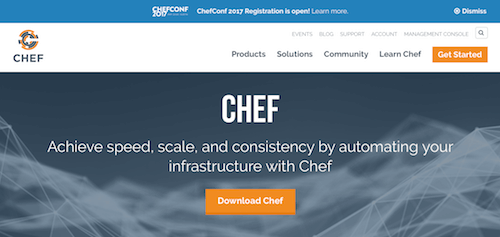
By automating your infrastructure, Chef is a DevOps tool for achieving speed, scale, and consistency. Chef turns infrastructure into code so that users easily and quickly can adapt to changing business needs.
Key Features:
- Accelerate cloud adoption
- Manage data center and cloud environments
- Manage multiple cloud environments
- Maintain high availability
Cost: FREE trials available
- Chef Basics: FREE
- Hosted Chef: $72/node, minimum 20 nodes
- Chef Automate: $137/node
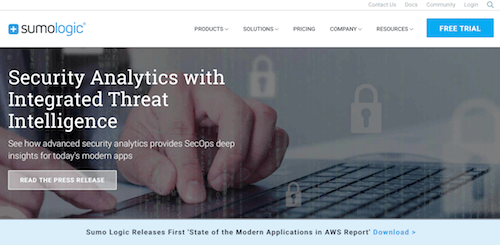
Sumo Logic helps leading companies analyze and make sense of log data. DevOps teams choose Sumo Logic because it combines security analytics with integrated threat intelligence for advanced security analytics with deep insights for modern applications.
Key Features:
- Build, run, and secure AWS, Azure, or Hybrid applications
- Cloud-native, machine data analytics service for log management and time series metrics
- One platform for real-time continuous intelligence
- Remove friction from your application lifecycle
Cost: FREE trial available
- Sumo Logic Free: FREE – Up to 500MB/day
- Professional: $90/month, 1 GB/day with annual pre-pay – 3-20 users
- Enterprise: $150/month, 1 GB/day with annual pre-pay – 20+ users
An open source multi-protocol messaging broker, RabbitMQ is a DevOps tool that supports a large number of developer platforms. RabbitMQ also runs on all major operating systems and is easy to use.
Key Features:
- Enables software applications to connect and scale
- Gives your applications a common platform for sending and reaching messages and provides a safe place for messages to sit until received
- Flexible routing, reliability, clustering, highly available queues, and more
Cost: FREE
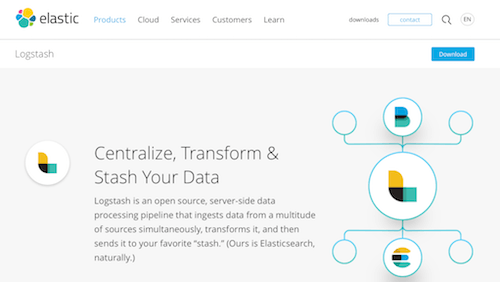
Logstash, from Elastic, is a DevOps tool for centralizing, transforming, and stashing data. An open source tool on the server side of data processing, Logstash simultaneously ingests data from multiple sources, transforms it, and sends it to the stash of your choice.
Key Features:
- Collect, parse, and transform logs
- Easily ingest from logs, metrics, web applications, data stores, and AWS services in continuous, streaming fashion
- Dynamically transforms and prepares data no matter its format or complexity
- Pipelines are multipurpose and may be sophisticated to give you full visibility when monitoring deployments or even an active Logstash node
Cost: FREE

A DevOps tool providing cloud log management, Loggly assists in logging data intelligence for modern infrastructure. Simplify log management and solve operational issues more quickly with little time or effort, thanks to Loggly.
Key Features:
- Mines scores of log data in real time
- Delivers insights DevOps teams need to produce quality code and ensure a superior user experience
- Get a bird’s-eye view of logs by seeing what is happening across distributed environments in real time
- Use data to search for answers
- Use open protocols rather than proprietary agents to send logs
- AWS DevOps Competency designation for providing effective solutions helping businesses access, manage and analyze log data across the entire application stack on AWS
Cost: FREE trial available
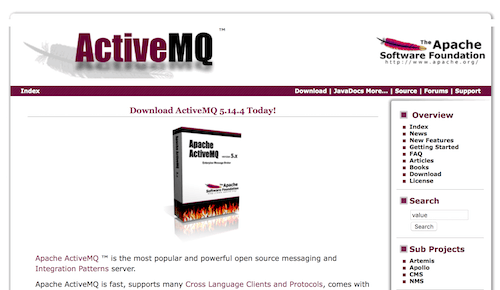
The Apache Software Foundation presents Apache ActiveMQ, a DevOps tool that is an open source messaging and integration patterns server. ActiveMQ is useful because it is fast, supports several cross language clients and protocols, includes easy-to-use enterprise integration patterns, and fully supports JMS 1.1 and J2EE 1.4.
Key Features:
- OpenWire for high-performance clients in Java, C, C++, and C#
- Supports advanced features like message groups, virtual destinations, wildcards, and composite destinations
- Spring support for easily embedding it into Spring applications; configured using Spring’s XML configuration mechanism
- Designed for high-performance clustering, client-server, peer-based communication
Cost: FREE
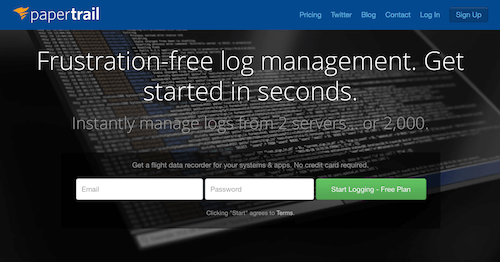
Papertrail offers hosted log management and delivers real-time tail and search, alerts, text files and syslog, and encryption. DevOps teams choose Papertrail when they want an easier time dealing with logs because this cloud-hosted log management tool eases frustration and allows for instant log management.
Key Features:
- Aggregate – All app logs, text log files, and syslog in one place
- Tail and Search – Realtime, using a browser, command-line, or API
- React and Analyze – Get instant alerts, detect trends, and archive forever
- Instant log visibility
- Realize value from logs you already collect
Cost:
- FREE plan – 48 hours search, 7 days archive, 5 GB first month bonus and then 100 MB/month
- 1 GB/month: $7 – 1 week search, 1 year archive
- 2 GB/month: $18 – 1 week search, 1 year archive
- 4 GB/month: $35 – 2 weeks search, 1 year archive
- 8 GB/month: $75 – 2 weeks search, 1 year archive
- 16 GB/month: $150 – 2 weeks search, 1 year archive
- 25 GB/month: $230 – 2 weeks search, 1 year archive
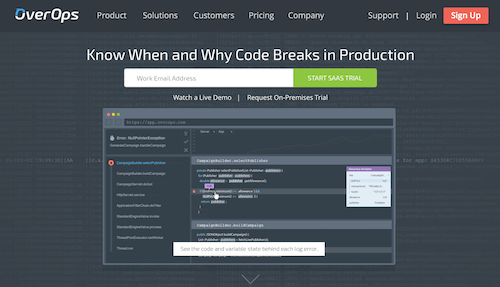
OverOps is the DevOps tool that tells teams why bugs happen and servers crash. Quickly and easily identify when and why code breaks in production with OverOps.
Key Features:
- Detects when production code breaks and delivers the source code and variable state that caused it to DevOps teams
- Improve staff efficiency by eliminating time wasted sifting through logs; get the complete source code and variable state to fix any error
- Proactively detects when deployments introduce errors
- Avoid release delays and spend time delivering great features rather than dealing with production issues
Cost: FREE Pro Trial available for 14 days
- Lite: FREE – 1 user/1JVM
- Pro: $109/month/JVM with annual plan – Up to 25 users
- Enterprise: Contact for a quote – Volume discounts are available
18. Squid@squidcache
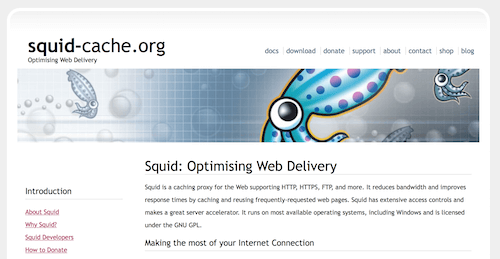
As a cache proxy for the web, Squid is a DevOps tool that optimizes web delivery and supports HTTP, HTTPS, FPT, and more. By reducing bandwidth and improving response times via caching and reusing frequently-requested web pages, Squid also operates as a server accelerator.
Key Features:
- Extensive access controls
- Runs on most available operating systems including Windows
- Licensed under the GNU GPL
- Optimizes data flow between client and server to improve performance
- Caches frequently-used content to save bandwidth
Cost: FREE
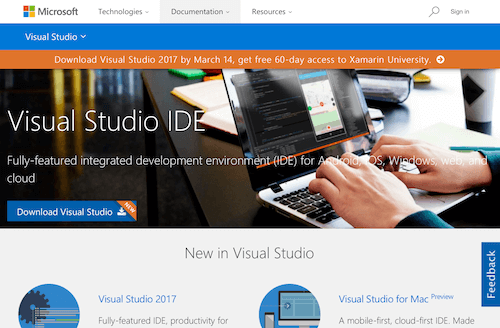
A fully-featured integrated development environment (IDE) for Android, iOS, web, and cloud, Visual Studio IDE is a DevOps tool from Microsoft. DevOps teams use Visual Studio IDE to write code accurately and efficiently while retaining the current file context.
Key Features:
- Easily zoom into details like call structure, related functions, check-ins, and test status
- Leverage Visual Studio IDE’s functionality to refactor, identify and fix code issues
- Build apps and games for devices running Windows, native or hybrid apps for Android or iOS or Windows, apps that scale to Azure, modern web apps with powerful tools and an extensible ecosystem, and more
- Easily develop and deploy SQL Server and Azure SQL databases with ease
Cost:
- Visual Studio Community: FREE – For students, open-source, and individual developers
- Visual Studio Professional: FREE trial available; Contact for a quote
- Visual Studio Enterprise: FREE trial available; Contact for a quote
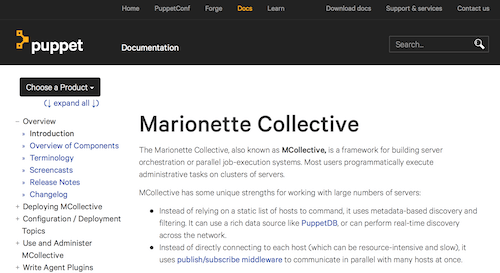
Puppet strives to build a world where software powering everything around us always is available, modern, and accessible from anywhere. Their Marionette Collective, or MCollective, is a DevOps tool that delivers a framework for building server orchestration or parallel job execution systems. MCollective is an ideal tool for DevOps teams working with large numbers of servers.
Key Features:
- Uses metadata-based discovery and filtering rather than relying on a static list of hosts to command it
- Can use a rich data source such as PuppetDB or can perform real-time discovery across the network
- Uses publish/subscribe middleware for communicating in parallel with several hosts at once instead of directly connecting to each host, which often requires too many resources and slows the pace
Cost: Contact for a quote
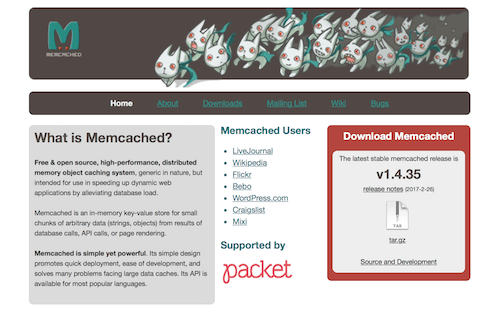
A free and open source high-performance distributed memory object caching system, Memcached is the DevOps tool that speeds up dynamic web applications by alleviating database load. While it is a simple tool, Memcached is powerful and promotes quick deployment, ease of development, and problem-solving for large data caches.
Key Features:
- API available for most popular languages
- In-memory key-value store for small chunks of arbitrary data from results of database calls, API calls, or page rendering
- Simple, yet powerful
Cost: FREE

The world’s most popular open source database, MySQL is a DevOps tool that saves teams time and money by making it faster and easier to deliver high performance, scalable database applications. MySQL offers several editions to meet users’ various business and technical requirements.
Key Features:
- Reduce the risk, cost, and complexity in developing, deploying, and managing business-critical MySQL applications
- High performance, reliability, and scalability
- Cross-platform flexibility
- Easy to use and fast installation, configuration, and integration make it possible for developers to focus on application development and reduce costs and time to market
Cost: Contact for a quote

An integrated technology suite enabling DevOps teams to build, ship, and run distributed applications anywhere, Docker is a tool that allows users to quickly assemble apps from components and work collaboratively. This open platform for distributed applications is appropriate for managing containers of an app as a single group and clustering an app’s containers to optimize resources and provide high availability.
Key Features:
- Package dependencies with your apps in Docker containers to make them portable and predictable during development, testing, and deployment
- Works with any stack
- Isolates apps in containers to eliminate conflicts and enhance security
- Streamline DevOps collaboration to get features and fixes into production more quickly
Cost:
- Community Edition: FREE
- Enterprise Edition Basic: Starting at $750/year
- Enterprise Edition Standard: Starting at $1,500/year
- Enterprise Edition Advanced: Starting at $2,000/year
24. Cacti
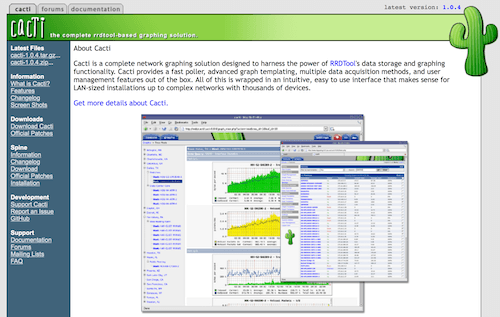
A complete RRDTool-based graphing solution, Cacti is a DevOps tool that provides complete network graphing that harnesses the power of RRDTool’s data storage and graphing functionality. Cacti is a popular DevOps tool because it features an intuitive and easy-to-use interface that is ideal for any application from LAN-sized installations through complex networks with thousands of devices.
Key Features:
- Provides a fast poller, advanced graph templating, multiple data acquisition methods, and user management features out of the box
- Create data sources that utilize RRDTool’s create and update functions
- Supports RRD files with more than one data source
Cost: FREE
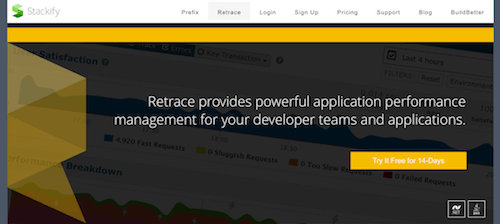
Working to help developers write even better code to become even better developers, Stackify offers Retrace. This DevOps tool delivers powerful application performance management for teams and applications and makes developers’ jobs easier.
Key Features:
- Quickly find bugs and improve application performance on QA/test and production servers
- Specifically designed to give developers visibility, data, and actionable insights
- SaaS-based APM
- Offers a single pane of glass for code performance and metrics including integrated errors and logs
- Gain deeper code insights like which cache key is being used and names of queues
- Works with most common app stacks
Cost: FREE trial available for 14 days
- Retrace (Pre-Production): $10/month/pre-production server
- Retrace (Production): $25/month/server (single core) or $50/month/server (multi-core)
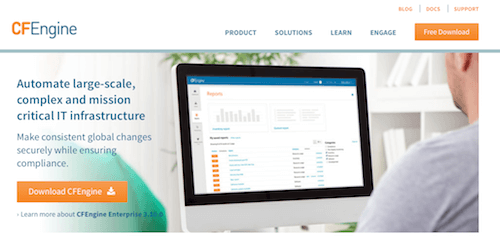
A DevOps tool for IT automation at web scale, CFEngine is ideal for configuration management and helps teams automate large-scale, complex, and mission-critical infrastructure. With CFEngine, you can ensure compliance even while securely making consistent global changes.
Key Features:
- A lean, fast solution with execution time less than one second
- Written in C
- An open source configuration solution with an unparalleled security record
- A mature solution that has conducted hundreds of billions of compliance checks in large-scale production environments
- Scalable: deploy a model-based configuration change across 50,000 servers in five minutes
Cost: FREE for up to 25 hosts

Delivering adaptable, fast automation for DevOps teams, Gradle is a build tool that accelerates developer productivity. Teams that utilize Gradle build, automate, and deliver software that is better, and they do it faster than ever before.
Key Features:
- Build anything by writing in Java, C++, Python, or whichever language you prefer
- Take advantage of Gradle’s rich API and mature ecosystem of plugins and integrations to automate everything
- Deliver faster by scaling out development with lightning-fast builds
Cost: FREE
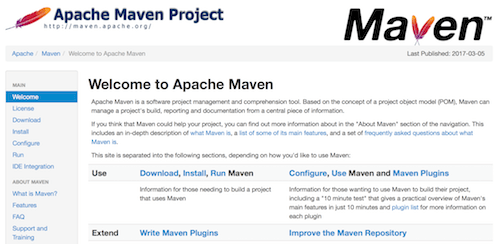
Part of the Apache line of projects from the Apache Software Foundation, Apache Maven is a project management and comprehension tool for DevOps teams. With Maven, users get a reliable tool for managing a project’s build, reporting, and documentation.
Key Features:
- Use consistently across all projects to simplify onboarding for new developers coming onto a project
- Simple projects setup that follows best practices
- Superior dependency management including automatic updating, dependency closures, and transitive dependencies
- Large, growing repository of libraries and metadata to use out of the box
Cost: FREE
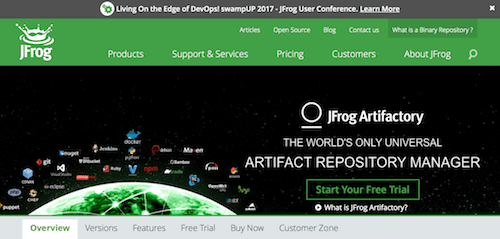
JFrog is a universal artifact repository and distribution platform. A unique DevOps tool, JFrog Artifactory is a universal artifact repository manager that fully supports software packages created by any language or technology.
Key Features:
- Enterprise-ready repository manager
- Supports secure, clustered, high-availability Docker registries
- Integrates with all major CI/CD and DevOps tools to provide an end-to-end, automated, bullet-proof solution for tracking artifacts from development to production
- Remote artifacts are cached locally for reuse, eliminating the need to download them again and again
Cost: FREE trial available
- JFrog Pro Edition: $2,950
- JFrog Pro SaaS Edition Google Cloud Platform: Starting at $85/month
- JFrog Pro SaaS Edition Microsoft Azure: Starting at $95/month
- JFrog Pro SaaS Edition Amazon Web Services: Starting at $98/month
- JFrog Enterprise SaaS Edition: Contact for a quote
- JFrog Enterprise Edition, starting with 3 servers: $29,500
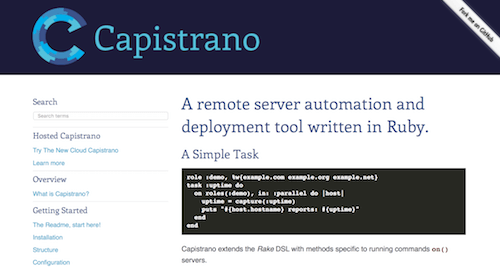
Capistrano is a remote server automation tool for DevOps teams. This tool supports scripting and executing arbitrary tasks and includes a set of sane-default deployment workflows.
Key Features:
- Reliably deploy web application to any number of machines simultaneously in sequence or as a rolling set
- Automate audits of any number of machines
- Script arbitrary workflows over SSH
- Automate common tasks in software teams
- Drive infrastructures provisioning tools such as chef-solo, Ansible, and the like
Cost: FREE
31. Redis@redisfeed
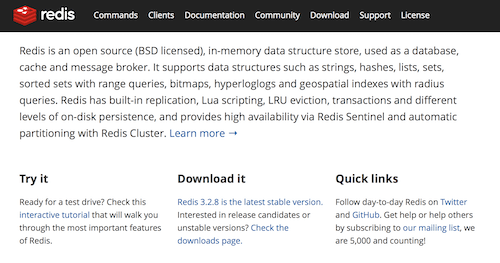
Redis is a data structure server used as a database, cache, and message broker. This DevOps tool supports data structures including strings, hashes, lists, sets, sorted sets, and more.
Key Features:
- Open source in-memory data structure store
- Supports bitmaps, HyperLogLogs and geospatial indexes with radius queries
- Built-in replication, Lua scripting, LRU eviction, transactions, and different levels of on-disk persistence
- Provides high availability via Redis Sentinel an automatic partitioning with Redis Cluster
Cost: FREE
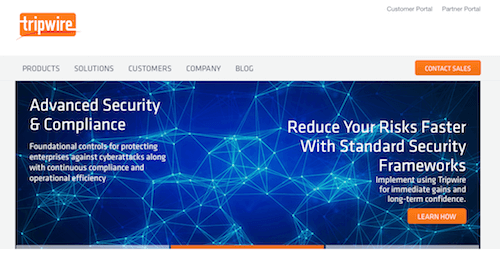
Tripwire is a leading provider of endpoint detection and response, security, compliance, and IT operation solutions for enterprises, service providers, and government agencies. DevOps teams use Tripwire to detect, prevent, and respond to cybersecurity threats quickly and confidently.
Key Features:
- Keep configurations in a known and trusted state and identify and remediate non-compliant changes using Tripwire’s nearly 800 policy/platform combinations
- Detect changes in real time
- Differentiate authorized and unauthorized changes and prioritize based on business context
- Reliably collects, normalizes, analyzes, and stores log data for immediate alerting of suspicious behaviors and to support detailed forensic analysis
Cost: Contact for a quote for the best Tripwire solution to fit your DevOps needs
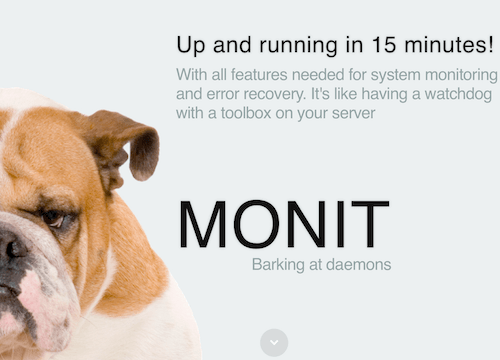
Monit is a DevOps tool for system monitoring and error recovery. Monit provides easy, proactive monitoring of processes, programs, files, directories, filesystems, and more and acts as “a watchdog with a toolbox on your server.”
Key Features:
- Small open source utility for managing and monitoring Unix systems
- Conducts automatic maintenance and repair
- Executes meaningful causal actions in error situations
Cost: FREE
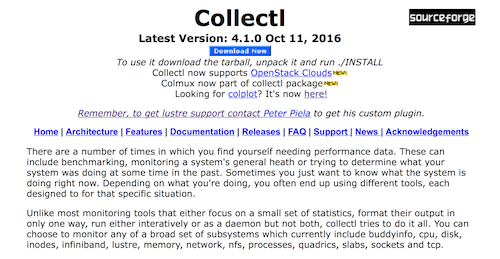
Collectl is a tool that delivers performance data to DevOps teams. Collectl is one tool that handles a number of tasks and alleviates the need to have several tools in your DevOps toolbox.
Key Features:
- Choose to monitor broad sets of subsystems including buddy info, cpu, disk, nodes, lustre, memory, network, tcp, slabs, sockets, or a number of others
- View output in a single line to spot spikes or other anomalies more easily
- Mix and match data in the brief format you need
- Choose to display information in verbose format
- Save output in a rolling set of logs for later playback or display it interactively in a variety of formats
- Supports OpenStack Clouds
Cost: FREE
35. Consul@HashiCorp
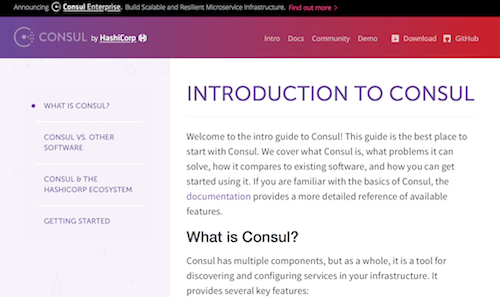
From HashiCorp, Consul is a DevOps tool used for discovering and configuring services in your infrastructure. Consul is an ideal tool for modern, elastic infrastructures because it is useful for those in the DevOps community and application developers.
Key Features:
- Provide a service such as API or MySQL
- Provide health checks associated either with a given service or with a local node
- Make use of the hierarchical key/value store for dynamic configuration, feature flagging, coordination, leader election, and more
- Supports multiple data centers out of the box
Cost: FREE
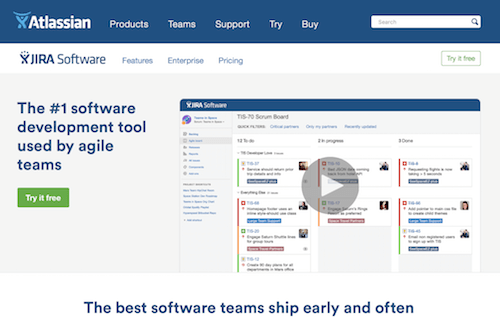
The leading software development tool used by agile teams, JIRA Software is used by DevOps teams for issue and project tracking. For teams that want to ship early and often, JIRA Software is the ideal tool because it is the singular tool every member of your team needs to plan, track, and release a great product.
Key Features:
- Create user stories and issues, plan sprints, and distribute tasks across DevOps teams
- Prioritize and discuss work in full context and with complete visibility
- Ship with confidence knowing the information you have always is current
- Improve team performance based on real-time, visual data
- Use an out-of-the-box workflow or create one tailored to your team
Cost: FREE trial available
- Cloud: Starts at $10/month for 10 users
- Server: Starts at $10/month for 10 users
- Data Center: Starts at $12,000/month for 500 users
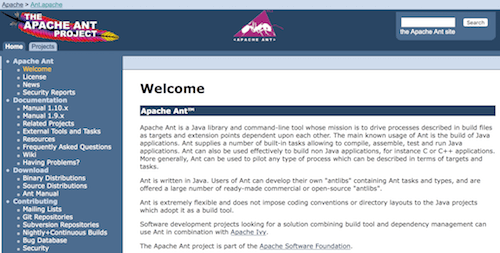
Apache Ant, part of the Apache Software Foundation, is a Java library and command-line tool. DevOps teams use Ant as a build automation tool because it saves time by driving processes described in build files as targets and extension points dependent upon each other.
Key Features:
- Supplies a number of built-in tasks for compiling, assembling, testing, and running Java applications
- May be used to build non-Java applications such as C or C++ apps
- Pilot any type of process that can be described in terms of targets and tasks
- Extremely flexible and does not impose coding conventions or directory layouts to the Java projects that use it as a build tool
Cost: FREE
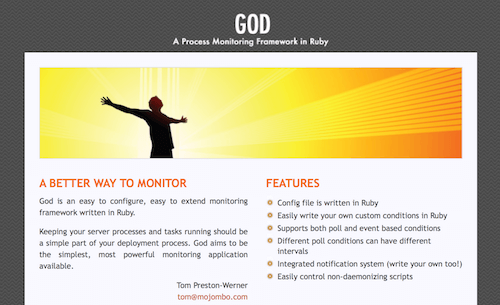
From Tom Preston-Werner, co-foudner and CCEO of GitHub, God is a process monitoring framework in Ruby that is easy to configure and extend. DevOps teams turn to God for keeping server processes and tasks running.
Key Features:
- Config file written in Ruby
- Integrated notification system or write your own
- Various poll conditions can have different intervals
- Easily write your own custom conditions in Ruby
- Easily control non-daemonizing scripts
Cost: FREE
39. ProductionMap

An open source, all-in-one platform for DevOps, ProductionMap was created by a group of IT and DevOps professionals to deliver the most advanced orchestrator and development platform available. This DevOps tool enables teams to develop and execute complex automation on a large scale of servers and hybrid technologies.
Key Features:
- Integrated visual platform for DevOps
- Makes automation development fast and easy
- Develop more robust products
- Document every change and reproduce previous executions quickly and easily
- Drag and drop with the orchestrator
Cost:
- FREE with registration
- DevOps professional services for developing automation using ProductionMap: Contact for a quote
40. Juju@ubuntucloud
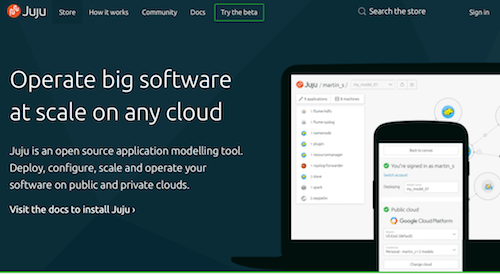
DevOps teams use Juju for automating cloud infrastructure and deploying application architectures. This tool, along with Juju’s best practice Charms, helps DevOps teams handle configuration, management, maintenance, deployment, and scalability more easily.
Key Features:
- Operate big software at scale on any cloud
- Deploy, configure, scale, and operate software on public and private clouds
- Choose a 5-node developer cluster or an 11-node production-grade cluster
- Spread the cost of expertise and amplify the power of your team with open source operations code and model-driven operations at any scale and on any cloud
Cost: FREE
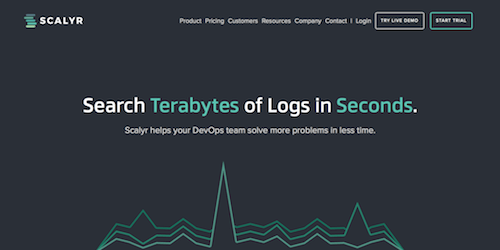
A SaaS platform for lightning-fast centralized log management, systems monitoring, and alerting, Scalyr is a DevOps tool that helps teams solve problems quickly. In fact, Scalyr searches terabytes of logs in mere seconds.
Key Features:
- Aggregates all server logs and metrics into a centralized system in real time
- Powerful web UI delivers search results in seconds
- Insights and visualizations for the entire DevOps team so you can diagnose issues before they grind operations to a halt
- Monitor key metrics, alert when trouble is about to strike, and keep operations moving smoothly
- Integrated suite of server monitoring, log management, visualization, and analysis tools to find and resolve more incidents in less time and all from one screen
Cost: FREE trial available for 30 days
- Silver: $99/month – 2GB/day log volume with 14 days retention
- Gold: $249/month – 5GB/day log volume with 21 days retention
- Platinum: $499/month – 10GB/day log volume with 30 days retention
- Enterprise: Contact for a quote
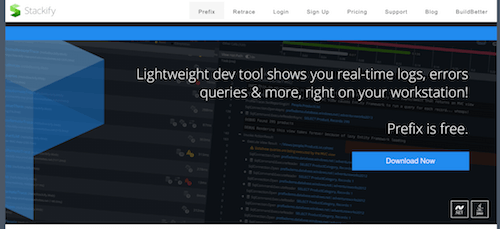
Stackify is a lightweight DevOps tool that shows real-time logs, errors queries, and more directly at your workstation. Rather than serving as a standard code profiler, Prefix displays details per web request to help teams understand what your code is doing and how long it takes.
Key Features:
- Detailed trace of every web request
- Eliminate messy config or code changes
- Runs fast and always is ready
- Provides an instant feedback loop to see what your .NET or Java web apps are doing
- Find and fix bugs prior to production
Cost: FREE
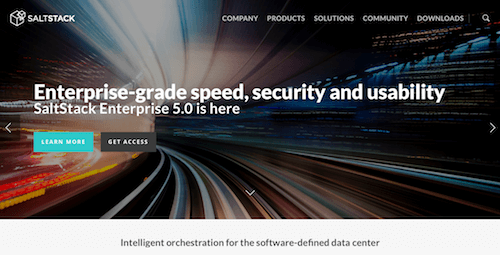
SaltStack is software for data-driven orchestration and configuration management at scale. This DevOps tool is the solution for intelligent orchestration for the software-defined data center.
Key Features:
- Manages heterogeneous computing environments
- Orchestrates any cloud
- Automates deployment of nearly any infrastructure and application stack used to create modern cloud, enterprise IT, and web-scale
- Proven and packaged for unique infrastructure automation, cloud orchestration, and configuration management requirements of DevOps, CloudOps, and ITOps at scale
Cost: Contact for a quote
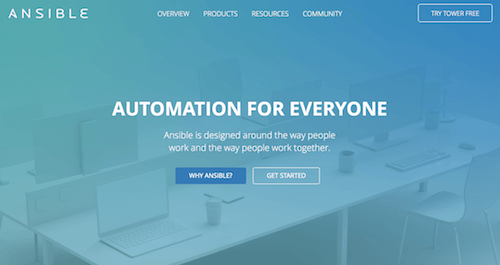
Providing the simplest way to automate IT, Ansible is a DevOps tool for automating your entire application lifecycle. Ansible is designed for collaboration and makes it much easier for DevOps teams to scale automation, manage complex deployments, and speed productivity.
Key Features:
- Deploy apps
- Manage systems
- Avoid complexity
- Simple IT automation that eliminates repetitive tasks and frees teams to do more strategic work
Cost: Contact for a quote
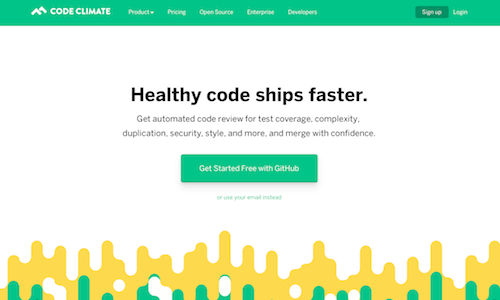
Code Climate helps teams ensure the health of your code, from the command line to cloud. With Code Climate, you get a DevOps tool for automated code review for test coverage, complexity, duplication, security, style, and more.
Key Features:
- Merge with confidence
- Fix issues sooner to ship better code more quickly
- Automated code review where you work
- Get immediate results within your pull requests
- Integrates directly into your workflow
- One interface for all data, from test coverage and style to security and code quality
Cost: FREE trial for 14 days
- Standard, Hosted: $16.67/set/month billed annually or $20/seat/month billed monthly
- Enterprise, On-Premise or Hosted: Contact for a quote
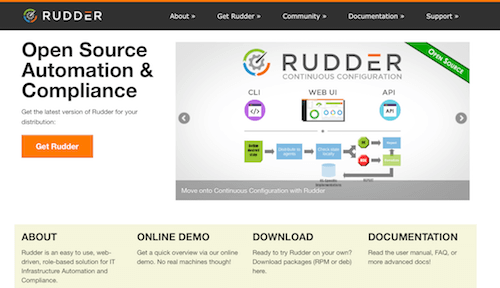
Rudder provides continuous configuration and auditing software for automatically measuring and correcting configuration drift on Linux, Windows, and more. This DevOps tool is an easy-to-use, web-driven, role-based solution for IT infrastructure automation and compliance.
Key Features:
- Workflow offers various user options at their own level: non-expert users, expert users, and managers
- Automate common system administration tasks such as installation and configuration
- Enforce configuration over time
- Inventory all managed nodes
- Web interface for configuring and managing nodes and their configuration
- Compliance reporting by configuration and/or by node
Cost: FREE
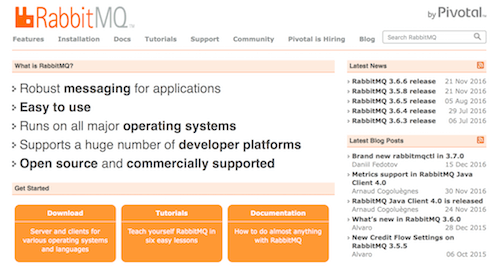
Very helpful list of DevOps tools. These tools are very helpful for all DevOps developers. Thanks for sharing
ReplyDeleteThanks for this great share. This post is much useful for us. This is very helpful for who wants to learn professional Education. It looks like you spend a lot of effort and time on your blog.
ReplyDeleteDevops Tools
Amazing article! I was confused about Selenium, but now got a clear view of the definition. Appreciate your hard work!
ReplyDeleteDevOps Training in Chennai
DevOps Certification
DevOps Certification Chennai
Thanks for this great share. This post is much useful for us. This is very helpful for who wants to learn professional Education. It looks like you spend a lot of effort and time on your blog.
ReplyDeleteDevOps Training in Chennai
DevOps Certification
DevOps Certification Chennai
Thank you for your information.it is very nice article.
ReplyDeleteDevops Training in Pune
Thank you for your information.it is very nice article.
ReplyDeleteDevops Training in Pune
well written .Keep sharing
ReplyDeleteDevops Online Course